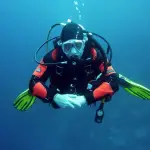
High blood pressure, also known as hypertension, can pose risks for diving due to the potential for cardiovascular complications underwater.
You should not scuba dive with high blood pressure, which is considered high if it’s above 160/100 by Divers Alert Network, or exceeds 140/90 by the Diving Medical Advisory Committee and the American Heart Association. Consult a medical professional if you are concerned about your blood pressure.
The diving community typically follows guidelines and recommendations to ensure the safety of divers. While I can provide some general information, it’s important to consult with a medical professional who specialises in diving medicine for personalised advice.
The guidelines for diving vary slightly among organisations, but as a general rule, individuals with high blood pressure should aim to keep their blood pressure well-controlled before participating in diving activities.
The following are some commonly referenced thresholds:
- Divers Alert Network (DAN): According to DAN, if a person’s systolic blood pressure (the higher number) exceeds 160 mmHg or their diastolic blood pressure (the lower number) exceeds 100 mmHg, they should be evaluated by a physician before diving.
- Diving Medical Advisory Committee (DMAC): DMAC suggests that individuals with high blood pressure should aim to keep their blood pressure below 140/90 mmHg before diving.
- American Heart Association (AHA): The AHA recommends that individuals with high blood pressure should have their blood pressure controlled below 140/90 mmHg in general, but specific thresholds for diving may vary.
It’s important to note that these thresholds are general guidelines, and individual circumstances and health conditions can influence the recommendations.
Diving places additional stress on the body, and elevated blood pressure can increase the risk of cardiovascular complications, including barotrauma, arterial gas embolism, and decompression sickness.
Therefore, it is crucial to undergo a thorough evaluation by a healthcare professional experienced in diving medicine to assess your suitability for diving based on your specific medical history and blood pressure management.
Does blood pressure affect scuba diving?
Blood pressure can affect scuba diving. Diving places additional physiological stress on the body, and having uncontrolled or excessively high blood pressure can increase the risk of complications during a dive.
Here are a few ways in which blood pressure can impact scuba diving:
- Cardiovascular Risks: High blood pressure can strain the cardiovascular system, making it less tolerant to the physical demands of diving. It increases the risk of cardiovascular events such as heart attacks, strokes, or other cardiac issues while underwater.
- Barotrauma: Barotrauma refers to the injury caused by pressure changes, typically when ascending or descending during a dive. Uncontrolled high blood pressure can make blood vessels more susceptible to damage, increasing the risk of barotrauma, especially in delicate areas like the lungs or ears.
- Decompression Sickness: Decompression sickness (DCS) occurs when dissolved gases, primarily nitrogen, form bubbles in the body’s tissues due to a rapid reduction in pressure. High blood pressure can affect the elimination of these gases, making a person more prone to DCS.
- Arterial Gas Embolism (AGE): AGE is a severe and potentially life-threatening condition that can occur when air bubbles enter the arterial circulation. High blood pressure can increase the risk of arterial damage, making it more likely for air bubbles to enter the bloodstream, leading to an embolism.
To ensure safety while diving, it’s essential to have your blood pressure under control and within acceptable limits before participating in any diving activities. Regular monitoring, lifestyle modifications, and appropriate medical management can help maintain optimal blood pressure levels. It is crucial to consult with a medical professional experienced in diving medicine for personalised advice based on your specific health condition.
You might also want to read about; is diving hard on the heart.
If you may be interested to learn more about liveaboard diving boats as a way to enjoy diving and to get more diving experience. If you are please take a look at the following window:
What blood pressure medication is used in scuba diving?
There is no specific blood pressure medication that is universally recommended or prescribed exclusively for scuba diving.
The choice of blood pressure medication depends on the individual’s specific medical condition, overall health, and response to different medications. The primary goal is to control blood pressure and ensure it remains within safe limits for diving.
Commonly used classes of blood pressure medications include:
- Angiotensin-Converting Enzyme (ACE) Inhibitors: Medications such as lisinopril, enalapril, or ramipril work by relaxing blood vessels, reducing blood pressure.
- Angiotensin II Receptor Blockers (ARBs): Medications such as losartan, valsartan, or candesartan block the effects of a hormone called angiotensin II, which constricts blood vessels.
- Calcium Channel Blockers: Medications such as amlodipine, nifedipine, or diltiazem relax and widen blood vessels by blocking calcium channels.
- Beta-Blockers: Medications such as metoprolol, atenolol, or propranolol reduce heart rate and the force of heart contractions, resulting in lowered blood pressure.
- Diuretics: Medications such as hydrochlorothiazide, furosemide, or spironolactone help reduce fluid volume and lower blood pressure by increasing urine production.
It’s important to note that the choice of medication and the dosage depend on the individual’s specific needs and medical history. A healthcare professional, such as a cardiologist or a physician experienced in diving medicine, can assess the individual’s health, evaluate their blood pressure control, and make recommendations based on their specific circumstances.
It’s crucial to maintain regular communication with your healthcare provider, especially if you’re a diver with high blood pressure. They can help monitor your blood pressure, adjust medications as needed, and provide guidance regarding diving suitability and safety.
Can you scuba dive on beta blockers?
The use of beta blockers and scuba diving is a topic that requires careful consideration and personalised medical advice. While beta blockers are a common class of medications used to treat high blood pressure and certain heart conditions, their effects on the body can impact a diver’s physiology underwater.
Here are some important points to consider:
- Reduced Heart Rate: Beta blockers work by reducing heart rate and the force of heart contractions. While this can be beneficial for certain heart conditions on land, it may affect the body’s response to the physical demands of diving, such as increased cardiac output during exertion or pressure changes underwater.
- Exercise Capacity: Beta blockers can potentially limit exercise capacity and may affect a diver’s ability to handle the physical exertion involved in diving. Reduced heart rate and cardiac output may impact the body’s ability to provide adequate blood flow and oxygen during increased exertion underwater.
- Decompression Stress: The use of beta blockers may affect the body’s response to decompression stress during ascent from a dive. Reduced heart rate and blood flow could potentially impact the elimination of dissolved gases, increasing the risk of decompression sickness.
Given these considerations, it is crucial to consult with a healthcare professional experienced in both diving medicine and cardiology.
They can evaluate your specific medical condition, assess your overall health, and make an informed decision regarding the suitability of scuba diving while on beta blockers. They may consider factors such as the type of beta blocker, dosage, your individual response to the medication, and the severity of your underlying condition.
It’s important to prioritise safety and follow the recommendations of your healthcare professional. They can guide you on managing your blood pressure, adjusting medications if necessary, and provide personalized advice based on your specific circumstances and diving goals.
What happens if you scuba dive with high blood pressure?
Scuba diving with high blood pressure can potentially increase the risk of complications and adverse events. The physiological stresses associated with diving, including pressure changes and physical exertion, can have implications for individuals with uncontrolled or excessively high blood pressure.
Here are some potential risks:
- Cardiovascular Events: High blood pressure puts additional strain on the cardiovascular system. Underwater, the physical exertion involved in diving, combined with pressure changes, can further increase the workload on the heart. This may raise the risk of cardiovascular events such as heart attacks, strokes, or other cardiac complications.
- Barotrauma: Barotrauma refers to injuries caused by pressure changes, often during ascent or descent. High blood pressure can weaken blood vessels, making them more susceptible to damage and increasing the risk of barotrauma. Delicate areas such as the lungs or ears may be particularly vulnerable.
- Decompression Sickness: Decompression sickness (DCS) occurs when dissolved gases, primarily nitrogen, form bubbles in the body’s tissues due to a rapid reduction in pressure. Uncontrolled high blood pressure can affect the elimination of these gases, potentially increasing the risk of DCS.
- Arterial Gas Embolism (AGE): Arterial gas embolism is a severe condition that can occur when air bubbles enter the arterial circulation. High blood pressure can increase the risk of arterial damage, making it more likely for air bubbles to enter the bloodstream and cause an embolism.
It’s important to note that the impact of high blood pressure on diving can vary depending on individual circumstances and the severity of the condition. Some divers with well-controlled blood pressure may be able to safely participate in diving activities, while others may need to take precautions or have limitations.
It’s crucial to consult with a healthcare professional experienced in diving medicine to assess your suitability for diving based on your specific medical history and blood pressure management. They can provide personalized advice and guidance to ensure your safety and well-being while diving.
I hope you enjoyed this article about what blood pressure is too high for diving?
I’d love to hear from you. Tell us about your adventures of diving and snorkelling. Please use the comments section below. Please also share your photos. Either from your underwater cameras or videos from your waterproof go-pro’s!
If this article hasn’t answered all of your questions. If you have more questions either about snorkelling or scuba diving (or specifically about what blood pressure is too high for diving), please comment below with your questions.
There will also be many more articles about scuba and scuba diving safety tips (and on snorkelling too) for you to read and learn about this fabulous sport.
Have fun and be safe!




